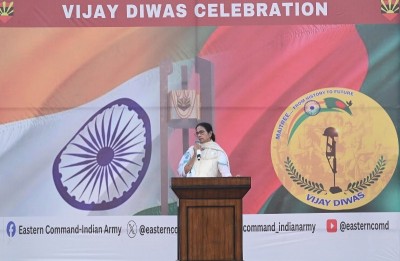
Abrogation of Article 370 is an internal administrative matter: Vice President Naidu
New Delhi/IBNS: Vice President M Venkaiah Naidu today said that the abrogation of Article 370 was an internal matter and that the move to bifurcate the state into two union territories was to ensure the overall development of both Jammu & Kashmir and Ladakh.
Addressing the delegation of more than 25 members of the European Parliament in New Delhi on Monday, he said that abrogation of Article 370 was a step towards equity and human dignity.
Naidu observed that the move would ensure good governance where people enjoy the fruits of freedom rather than be constantly under the fear of the bullet.
The Vice President said that the proposition was put to vote in the Parliament on 5th and 6th August 2019 and it received Parliament’s unequivocal mandate.
“The Lower House voted 80% in favour and in the Upper House, nearly 66% supported the Bill,” he added.
Stressing that Jammu and Kashmir has been an integral part of India since the acceptance or accession, the Vice President said that the Indian Constitution incorporated a provision under Article 370 according to special status to the State and that it was intended to be a transitory provision from the beginning.
The Vice President said that the special provisions and their consequences have been reviewed time and again over the last few decades and the Indian Parliament had debated the issue several times.
He said that it was widely felt that having an enclave within the country was not desirable and was seen as antithetical to an inclusive growth strategy where the country aims to bridge development gaps between states and achieve an equitable growth leaving no state behind.
Stating that the state was beset with a host of formidable impeding challenges like corruption, lack of accountability and most disturbing of all, growing threat of militancy and cross-border terrorism along with slow development, the Vice President said that the situation in the state after 70 years of Indian independence convinced the policymakers that they could not allow the rapid downslide to continue.
He said that the Government, therefore, had to take the best possible steps for preventing any loss of life or property.
The Vice President said that it was to the credit of the Government that these measures have succeeded in full, as not a single bullet has been fired till date and there has not been any loss of life on account of any police firing.
He said that the restrictions were only temporary in character and relaxations were being given step by step and stage by stage.
The Vice President told the delegation that several steps have been taken by the Government to ensure smooth flow of information in the Jammu & Kashmir.
Talking about the recently held elections to Block Development Councils, he said that 98.3% voter turnout was an indicator for a very peaceful election.
The Vice President said that India wishes to see a more just, peaceful and responsive world order and that it was building a richly diverse, harmonious, democratic polity to ensure all-round development and inclusive growth.
Pointing out that India has believed in the principle of peaceful co-existence right from the Vedic times and that it had conceptualized the entire the world as one family, Naidu told the EU delegation that India believes that peace was the pre-requisite for progress and wishes to bring peace to troubled areas, so that people enjoy a better quality of life.
The Rajya Sabha Chairman also told the visiting Parliamentarians that India was moving towards inclusive development with the Parliament playing the role of a catalyst and a proactive leader in this transformative process.
He also informed the delegation that India was keen on engaging with the EU on regional and global issues of shared concern and also for reforming the multilateral system and institutions to better reflect contemporary global realities.
Support Our Journalism
We cannot do without you.. your contribution supports unbiased journalism
IBNS is not driven by any ism- not wokeism, not racism, not skewed secularism, not hyper right-wing or left liberal ideals, nor by any hardline religious beliefs or hyper nationalism. We want to serve you good old objective news, as they are. We do not judge or preach. We let people decide for themselves. We only try to present factual and well-sourced news.







